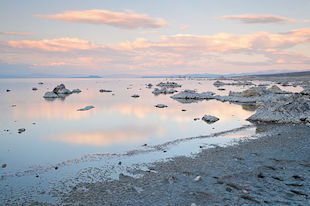 Mono Lake, a haven for salt-loving microbesWIKIMEDIA, KING OF HEARTSIf there’s any hope of finding microbial life that can thrive on Mars or elsewhere in the Solar System, scientists are likely to first find it in extreme environments on Earth. Researchers from Wichita State University in Kansas and colleagues recently discovered that bacteria can survive at high concentrations of perchlorates, salts that were long considered toxic to life. Meanwhile, a team from Louisiana State University in Baton Rouge has identified a type of archaea called Halobacteriales that can “breathe” carbon monoxide in the presence of these strongly oxidizing salts. Both groups presented their unpublished findings last week (June 17) at the American Society for Microbiology’s annual meeting in Boston.
Mono Lake, a haven for salt-loving microbesWIKIMEDIA, KING OF HEARTSIf there’s any hope of finding microbial life that can thrive on Mars or elsewhere in the Solar System, scientists are likely to first find it in extreme environments on Earth. Researchers from Wichita State University in Kansas and colleagues recently discovered that bacteria can survive at high concentrations of perchlorates, salts that were long considered toxic to life. Meanwhile, a team from Louisiana State University in Baton Rouge has identified a type of archaea called Halobacteriales that can “breathe” carbon monoxide in the presence of these strongly oxidizing salts. Both groups presented their unpublished findings last week (June 17) at the American Society for Microbiology’s annual meeting in Boston.
“It’s a pretty good bet that wherever one finds water in an extraterrestrial system, it’s going to be salty,” microbiologist Gary King of Louisiana State, who led the carbon monoxide study, told The Scientist.
Life on Earth requires liquid water. Mars is far too cold and arid for liquid water to exist in abundance on its surface. But perchlorates—which the Phoenix lander and Curiosity rover have found in Martian regolith—could absorb water from the planet’s atmosphere, forming deliquescent brines that might support life.
Scientists have studied microbes that live in extremely salty environments—such as the Great Salt Lake and the Dead Sea—for more than a century. Most of their research has focused on how these organisms survive at high concentrations of sodium chloride, but few ...




















